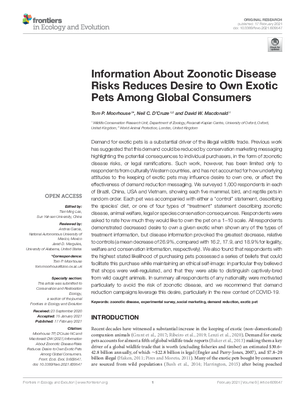Information About Zoonotic Disease Risks Reduces Desire to Own Exotic Pets Among Global Consumers
Demand for exotic pets is a substantial driver of the illegal wildlife trade. Previous work has suggested that this demand could be reduced by conservation marketing messaging highlighting the potential consequences to individual purchasers, in the form of zoonotic disease risks, or legal ramifications. Such work, however, has been limited only to respondents from culturally Western countries, and has not accounted for how underlying attitudes to the keeping of exotic pets may influence desire to own one, or affect the effectiveness of demand reduction messaging.
https://biodiversitylinks.org/learning-evidence/one-health-evidence/one-health-evidence-inbox/information-about-zoonotic-disease-risks-reduces-desire-to-own-exotic-pets-among-global-consumers.pdf/view
https://biodiversitylinks.org/learning-evidence/one-health-evidence/one-health-evidence-inbox/information-about-zoonotic-disease-risks-reduces-desire-to-own-exotic-pets-among-global-consumers.pdf/@@download/image/image.png
File
Information About Zoonotic Disease Risks Reduces Desire to Own Exotic Pets Among Global Consumers
Author(s):
Tom P. Moorhouse,
,
Neil C. D’Cruze
,
David W. Macdonald
Publication Date: 2021
DOWNLOAD FILE
Demand for exotic pets is a substantial driver of the illegal wildlife trade. Previous work has suggested that this demand could be reduced by conservation marketing messaging highlighting the potential consequences to individual purchasers, in the form of zoonotic disease risks, or legal ramifications. Such work, however, has been limited only to respondents from culturally Western countries, and has not accounted for how underlying attitudes to the keeping of exotic pets may influence desire to own one, or affect the effectiveness of demand reduction messaging.



